Related Research Articles
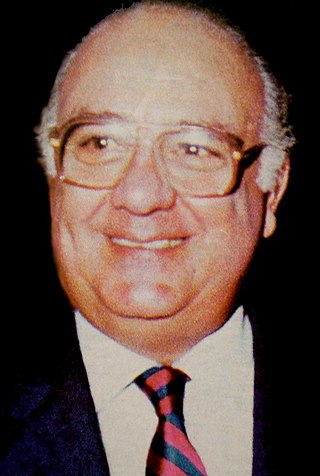
Jaime Ramón Lusinchi was the president of Venezuela from 1984 to 1989. His term was characterized by an economic crisis, growth of the external debt, populist policies, currency depreciation, inflation and corruption that exacerbated the crisis of the political system established in 1958.

Democratic Action is a Venezuelan social democratic and centre-left political party established in 1941. The party played an important role in the early years of Venezuelan democracy, leading the government during Venezuela's first democratic period (1945–1948). A decade of dictatorship under Marcos Pérez Jiménez followed, which saw AD excluded from power. With the advent of democracy in 1958, four Presidents of Venezuela came from Acción Democrática from the 1950s to the 1990s during the two-party period with COPEI.
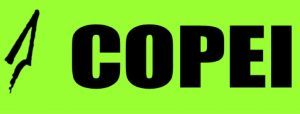
COPEI, also referred to as the Social Christian Party or Green Party, is a Christian democratic party in Venezuela. The acronym stands for Comité de Organización Política Electoral Independiente, but this provisional full name has fallen out of use. The party was influential during the twentieth century as a signatory of the Puntofijo Pact and influenced many politicians throughout Latin America at its peak.
The Venezuelan Popular Union was a political party in Venezuela. The UPV was built along 'Browderist' pattern. UPV had its roots in the Municipal Union (UM), which had been legalized in 1941 and had functioned as a legal cover for the underground Communist Party of Venezuela. The party was founded on March 13, 1944 through the merger of the Municipal Union of the Federal District, the Zulian Unification League and eleven state-level 'People's Unions'. The decision to form UPV as a political party was taken at the Fourth National Conference of the Communist Party of Venezuela.
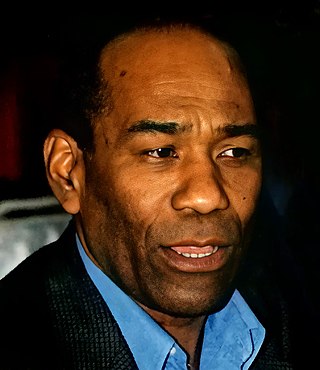
Aristóbulo Istúriz Almeida was a Venezuelan politician and academic. He was vice president of the Constituent Assembly of Venezuela as well as vice president of Venezuela.

Octavio Lepage Barreto was a Venezuelan politician who served as the acting president of Venezuela from 21 May 1993 to 5 June 1993.

Regional elections were held in Venezuela on 31 October 2004 to elect 22 governors and 2 metropolitan mayors for a four-year term beginning in 2004 and ending in 2008, when the next regional elections were held. The elections were originally scheduled for 26 September 2004, but faced technical issues and an application for annulment requested by the opposition, and were held under high political pressure after the events of the recall referendum of August 2004. The ongoing political crisis in the country and the proximity of the two electoral processes marked the environment of the elections, which were won by the candidates supported by the president, Hugo Chavez.
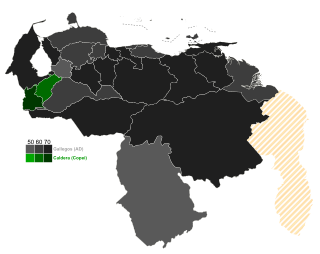
General elections were held in Venezuela on 14 December 1947. The presidential elections were won by Rómulo Gallegos of Democratic Action, who received 74.3% of the vote, the largest presidential win in Venezuela's modern history. His party won 83 of the 110 seats in the Chamber of Deputies and 38 of the 46 seats in the Senate.

The Democratic Unity Roundtable was a catch-all electoral coalition of Venezuelan political parties formed in January 2008 to unify the opposition to President Hugo Chávez's United Socialist Party of Venezuela in the 2010 Venezuelan parliamentary election. A previous opposition umbrella group, the Coordinadora Democrática, had collapsed after the failure of the 2004 Venezuelan recall referendum.

Constituent Assembly elections were held in Venezuela on 27 October 1946, following a coup the year before which launched El Trienio Adeco. The result was a victory for Democratic Action, which won 137 of the 160 seats in the Assembly. Voter turnout was 86.6%.
¡Aquí Está! was a Venezuelan weekly newspaper, the central organ of the Communist Party of Venezuela. ¡Aquí Está! was founded in 1942 by Miguel Otero Silva, as the Venezuelan political climate was liberalized under Isaías Medina Angarita. ¡Aquí Está! substituted the previous Communist Party organ El Martillo, which had been re-launched in 1938. ¡Aquí Está! was marked by a 'Browderist' editorial line. Apart from Otero Silva, other editors of ¡Aquí Está! were Carlos Augusto Léon and Ernesto Silva Tellerías. The newspaper was published from Caracas. Through ¡Aquí Está! the Communist Party was able to win a considerable influence over the urban intelligentsia.

The Democratic Action Party was a Spanish political party of social democratic ideology.
The Authentic Renewal Organization (ORA) is an Evangelical and Pentecostal political party in Venezuela, originally founded in 1988 by Godofredo Marín and Carlos Mendez.
Parliamentary elections were held in Venezuela on 6 December 2020. Aside from the 167 deputies of the National Assembly who are eligible to be re-elected, the new National Electoral Council president announced that the assembly would increase by 110 seats, for a total of 277 deputies to be elected.
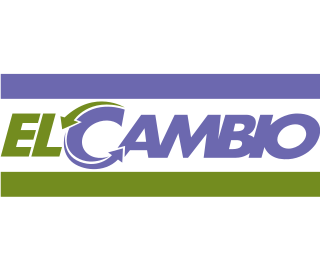
Hope for Change is a Venezuelan political party registered by the Consejo Nacional Electoral (CNE) with the shortened name El Cambio. In the 2018 presidential election, Venezuelan pastor and party leader Javier Bertucci received enough votes to turn Hope for Change into an official political party. Aside from Bertucci, other leaders of the party include Alfonso Campos, the party's Secretary-General, Jeickson Portillo, its National Coordinator, and Luis Adames, its Undersecretary.
The Revolutionary Party of the Proletariat (Communist) (Spanish: Partido Revolucionario del Proletariado (Comunista), abbreviated P.R.P.(C)), nick-named 'the Black Communists', was a political party in Venezuela 1947-1952.
The Progressive Liberal Party was a political party in the Amazonas Federal Territory of Venezuela. The party had a loose organization and was set up ahead of the 1947 Venezuelan general elections. The PLP was close to the Democratic Republican Union (URD). PLP won the sole parliamentary seat in the Amazonas Federal Territory in the December 1947 elections, obtaining 860 votes. PLP also won the municipal election held alongside the parliamentary vote, winning 3 out of the 5 seats in the Municipal Council of the Amazonas Federal Territory.

The Democratic Alliance was a political coalition created to face the government of Nicolás Maduro in the 2020 Venezuelan parliamentary election and grouped in the National Assembly. It is made up of Hope for Change, Cambiemos and Progressive Advance parties of the predecessor coalition Agreement for Change, in addition to the intervened parties Democratic Action and Copei, and the later incorporated Primero Venezuela, United Venezuela, Ecological Movement, Unidad Vision Venezuela, Country Commitment and the also intervened Popular Will.

Several interventions of political parties in Venezuela have occurred during Nicolás Maduro's government. The interventions are mandated by the pro-government Venezuelan Supreme Tribunal of Justice. During these interventions, the leadership or most of the political party members end up suspended, expelled or replaced by members appointed by the TSJ.
References
- 1 2 3 4 John D. Martz (8 December 2015). Accion Democratica: Evolution of a Modern Political Party in Venezuela. Princeton University Press. p. 77. ISBN 978-1-4008-7587-0.
- 1 2 Rafael Arráiz Lucca (15 February 2016). El «trienio adeco» (1945-1948) y las conquistas de la ciudadanía. Editorial Alfa. ISBN 978-84-16687-12-1.
- 1 2 Historia electoral de Venezuela: 1810-1998. Los Libros de El Nacional. 1998. p. 105. ISBN 978-980-6423-21-3.
- 1 2 3 Robinson Salazar Perez; Alvaro Ballardo Marquez Fernandez (2005). Transformaciones Sociopoliticas Recientes En America Latina. LibrosEnRed. p. 170. ISBN 978-1-59754-109-1.
- ↑ Manuel Vicente Magallanes (1973). Cuatro partidos nacionales: Acción Democrática, Copei, Partido Comunista de Venezuela, Unión Republicana Democrática. Diana, Artes Gráf., Madrid. p. 87. ISBN 9788471561428.
- ↑ Arturo Cardozo (1987). Luchas revolucionarias en Venezuela y el mundo: t. 1o. 1917-1957. A. Cardozo. p. 89. ISBN 978-980-300-055-4.
- ↑ Donna Keyse Rudolph; G. A. Rudolph (1996). Historical Dictionary of Venezuela. Scarecrow Press. p. 517. ISBN 978-0-8108-3029-5.
- ↑ Clara Marina Rojas (1 January 1992). El inicio del juego democrático en Venezuela: un análisis de las elecciones 1946-1947. Academia Nacional de la Historia. p. 46. ISBN 978-980-222-559-0.
- 1 2 3 4 Los Partidos políticos y sus estadísticas electorales, 1946-1984. Consejo Supremo Electoral, División de Estadística. 1987. pp. 43–44.
- ↑ Los Partidos políticos y sus estadísticas electorales, 1946-1984. Consejo Supremo Electoral, División de Estadística. 1987. p. 405.